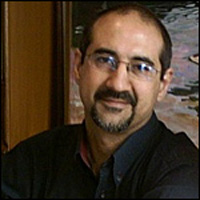Detained Iranian-American consultant expects to be released soon

An Iranian-American consultant detained for months in Tehran's Evin prison told reporters during a visit to the prison Tuesday that he expects to be released soon and that Iranian authorities have raised no formal charges against him.
"I expect to be released soon, conditions inside the prison are fine," said Kian Tajbakhsh, an urban planning consultant with the Soros Foundation's Open Society Institute.
Although authorities said they have charged Tajkbash with endangering national security - as they have the recently released American-Iranian scholar Haleh Esfandiari - Tajkbash claimed his case was still under investigation.
However, Ali Reza Jamshidi, Iranian Judiciary spokesman, told reporters that charges indeed have been raised against Tajbaksh but that the Iranian-American would likely be "released soon, probably within the next few days."
Iranian authorities invited media Tuesday to visit the Evin prison, notorious for the conditions in which it holds political prisoners. During the tour, reporters were allowed to briefly speak with Tajkbash.
Tajkbash, who did not wear a prison uniform and appeared healthy, said he is held in solitary confinement, but that he has access to television and a private bath.
"I have weekly visits with my wife, and have telephone conversations with her every night," Tajkbash said. He declined to say anything more about his circumstances "until formal charges are raised."
Tajbakhsh, who has been held since May, was shown in July on a video by Iran's state TV, along with Esfandiari. The TV program was titled "In the Name of Democracy" and included clips of Tajkbash's and Esfandiari's purported confessions.
In the broadcast, Tajbakhsh said that his organization tried to create a "gap between the government and the nation."
But on Tuesday he told reporters at Evin Prison that he "doesn't see that as confessions."
The Open Society Institute has criticized the Iranian government for the broadcast and dismissed the statement in it as "coerced."
Other American-Iranians are suspected of security offenses.
Ali Shakeri, a founding board member of the Center for Citizen Peacebuilding at the University of California, Irvine, also is in custody in the Tehran prison.
Media did not see Shakeri during the visit Tuesday.
Esfandiari, 67, a scholar at the Woodrow Wilson International Center, was held for 105 days in Evin before her release in August. Earlier this month, she returned home to the United States after Iranian authorities returned her passport.
On her red to return home, Esfandiari expressed frustration that Iranian intelligence officials mistakenly believed her work was part of a larger U.S. attempt to start a nonviolent revolution in Iran.
A fourth Iranian-American, journalist for U.S.-funded Radio Farda Parnaz Azima, recently was given her passport back and said she would leave Iran in the near future.
The cases of the four have sharply added to escalating tensions between the United States and Iran.
Washington accuses Iran of arming Shiite Muslim militants in Iraq and seeking to develop nuclear weapons. Tehran denies those claims, and blames the U.S. for Iraq's instability.
Subscribe to Pravda.Ru Telegram channel, Facebook, RSS!


